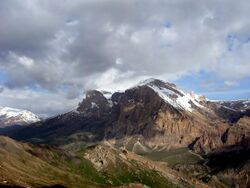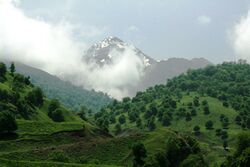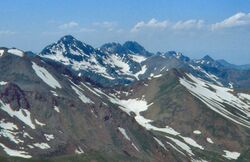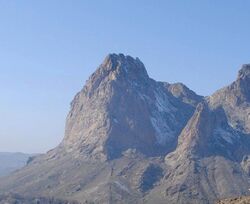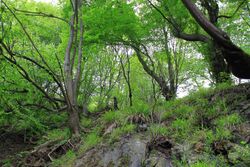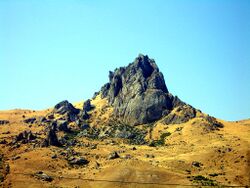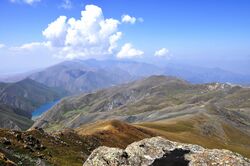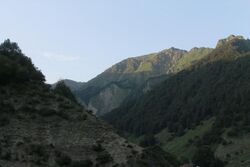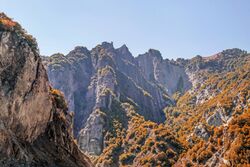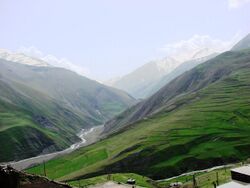Earth:Mountains of Azerbaijan
Mountains of Azerbaijan cover approximately 60 percent of the country's land area.[1][2] There are three mountain ranges in the territory of Azerbaijan, which are the Greater Caucasus, the Lesser Caucasus, and the Talysh Mountains.[3] The elevation of the central mountains of these three mountain ranges is approximately 1000 – 2000 meters.[1] The height of high mountains of the Greater Caucasus is higher than 2200 meters and the Lesser Caucasus is higher than 2000 meters.[1]
| Mountain ranges in Azerbaijan[1] | ||
| Mountain ranges | Area coverage (%) | Zones |
| Greater Caucasus | 30 | Foothill (lower than 500 meters) |
| Low mountains (500 – 1200 meters) | ||
| Middle mountain (1200 – 2200 meters) | ||
| High mountains (higher than 2200 meters) | ||
| Lesser Caucasus | 22 | Foothill (lower than 500 meters) |
| Low mountains (500 – 1200 meters) | ||
| Middle mountain (1200 – 2000 meters) | ||
| High mountains (higher than 2000 meters) | ||
| Talysh Mountains | 6 | Pre – mountain plains (lower than 600 meters) |
| Low mountains (600 – 1000 meters) | ||
| Middle mountain (1000 – 2500 meters) | ||
The Greater Caucasus range forms the north-east borders of Azerbaijan with Dagestan Autonomous Republic of Russia.[4] Bazarduzu, Shahdagh, and Tufandag are the high peaks of the mountain range.[5] The highest peak of the Greater Caucasus is Mount Bazarduzu, which is situated 14,652 feet (4466 meters) above the sea level, is also the highest point in Azerbaijan.[3][5] The mountains of the Greater Caucasus are located in the region of high degree of seismic activity.[5] The mountains are formed by rocks that date back to Jurassic and Cretaceous periods.[2]
The Lesser Caucasus is the second important mountain range in Azerbaijan and forms its south-western borders.[5] Mount Murovdag and Mount Zangezur are the main ridges of the Lesser Caucasus.[5] They are formed by sedimentary and volcanogenic rocks of Cretaceous and Jurassic periods.[2]
The Talysh Mountains cover the southeastern part of Azerbaijan and form part of its border with Iran.[4][5]
Mountains of the Greater Caucasus
Bazarduzu
The highest peak of the Greater Caucasus, Mount Bazarduzu, is the highest mountain in Azerbaijan.[3][6] It lies on the borders between Azerbaijan and Russia .[3] The rocks of Mount Bazarduzu are formed of shale porphyries.[7] Ice fields that consist of glaciers from Ice Age on the mountain are the biggest glaciers in the Eastern Caucasus.[7]
The first person who climbed the Mount Bazarduzu was Aleksej Aleksandrov from Russia in 1847.[3][7]
Shahdagh
The elevation of Mount Shahdagh is 13951 feet (4243 m), which is the second highest peak in the Greater Caucasus.[3][8] The mountain is located near to the border with Russia, in Gusar region of Azerbaijan.[3] There are caves at the base of the Mount Shahdagh, which show manmade activities around the mountain for over 9000 years.[3] The rocks of the mountain are formed by dolomites and limestones.[8]
Tufandag
It is the third highest mountain in Azerbaijan with the height of 13770 feet (4191 m.).[3] Mount Tufandag lies in the Gusar region.[9]
| List of mountains of the Greater Caucasus[9] | |||
| Name | Original name | Elevation (m) | Region |
| Bazarduzu | Bazardüzü | 4466 | Russian – Gusar border |
| Shahdagh | Şahdağ | 4243 | Gusar |
| Tufandag | Tufandağ | 4191 | Gusar |
| Bazaryurd | Bazaryurd | 4126 | Gusar and Gabala |
| Yarudag | Yarıdağ | 4116 | Gusar |
| Chingiz Mustafayev | Çingiz Mustafayev | 4062 | Guba |
| Ilham Peak | İlham zirvəsi | 4042 | Gusar |
| Heydar Peak | Heydər zirvəsi | 3751 | Gusar |
| Khinalig | Xınalıq | 3713 | Guba |
| Ragdan | Raqdan | 4020 | Gabala |
| Babadag | Babadağ | 3629 | Ismayilli |
| Atatürk | Atatürk | 3759 | Guba |
| Olympia Peak | Olimpiya zirvəsi | 3455 | Gusar |
| Ateshgah | Atəşgah | 2151 | Guba |
| Gizil Gaya | Qızıl Qaya | 3726 | Guba |
Mountains of Lesser Caucasus
Murovdag
Within the Lesser Caucasus, the highest mountain ridge is Murovdag.[10] The range of the mountain is approximately 70 kilometers.[10]
Gamishdag
The highest peak of the Murovdag ridge is Gamishdag and its elevation is 3724 meters.[11]
Zangezur
The Zangezur mountain ridge bordered with Aghdaban peak in north-west and Araz river in south-east.[12] The range of the Zangezur ridge is approximately 130 kilometers.[12] In the center and south-east parts of the ridge, there are Gamigaya, Kaputjukh, Garangush, Davabouynu, Aychingil peaks.[12] Prominent mountains of the Zangezur ridge are Nahajir, Alinja, Ilandag, Gurddag, and Gizilboghaz mountains.[12]
Kaputjukh
Mount Kaputjukh is the highest peak of the Zangezur ridge and the highest mountain in the Lesser Caucasus.[11][13] The height of the mountain is 3904 meters.[11][13] It lies in Ordubad region of Nakhchivan.[13] There are ancient Gamigaya inscriptions on the rocks that are at the bottom of the mountain.[13]
Alinja
Mount Alinja is located in Julfa region of Nakhchivan, on the shore of the river with the same name as mountain.[13] The elevation of Mount Alinja is 1811 meters.[13] It has volcanic origins.[13]
| List of mountains of the Lesser Caucasus[14] | |||
| Name | Original name | Elevation (m) | Ridge |
| Kaputjukh | Qapıcıq | 3904 | Zangezur |
| Dalidag | Dəlidağ | 3616 | Garabagh volcanic highland |
| Gamish | Gamışdağ | 3724 | Murovdag |
| Kapaz | Kəpəz | 3066 | Murovdag |
| Goshgar | Qoşqar | 3361 | Murovdag |
| Hinaldag | Hinaldağ | 3367 | Murovdag |
| Gizilboghaz | Qızılboğaz | 3581 | Garabagh volcanic highland |
| Boyuk Ishigli | Böyük Işıqlı | 3550 | Garabagh volcanic highland |
| Alinja | Əlincə | 1811 | Zangezur |
Talysh Mountains
Talysh mountains are located in the south – east of Azerbaijan. There are three mountain ridge within the Talysh mountains, which of elevations reach 2477 meters.[2] They are Talysh, Burovar, and Peshteser.[2] There are few peaks that of heights are above 3000 meters (10000 ft).[15] The rocks of the mountains originated from volcanic rocks and carbonate rocks that date back to the Jurassic, Cretaceous, and Paleogene periods.[15]
Kyumyurkyoy
The highest peak of Talysh mountains is the Mount Kyumyurkyoy (2493 meters).[5]
Gizyurdu
Mount Gizyurdu is the second highest peak of Talysh mountains with the height of 2433 meters.[14]
| List of the highest peaks of Talysh Mountains[14] | ||
| Name | Original name | Elevation (m) |
| Kyumyurkyoy | Gömürgöy | 2493 |
| Gizyurdu | Qızyurdu | 2433 |
Other mountains
thumb|250x250px|alt=
Mount Goyazan
The elevation of Mount Goyazan is located 20 kilometers far from Qazakh district of Azerbaijan.[16] Its elevation is 250 meters.[16] The mountain has volcanic origin and it is not connected to any mountain ridges.[16] At the bottom of the mountain, there are ancient dwellings.[16]
Yanar Dag
Yanar Dag is located 27 kilometers far from Baku.[17] On the surface of Yanar Dag, there are fires of natural gas that flames continuously, and their height reaches to 10–15 meters.[17]
The historical-cultural and natural reserve was established in the territory of Yanar Dag by the presidential decree dated May 2, 2007.[17]
Gallery
See also
- Geography of Azerbaijan
References
- ↑ 1.0 1.1 1.2 1.3 Price, Martin (2000). Cooperation in the European Mountains 2: The Caucasus. Switzerland: IUCN. ISBN 2831705347.
- ↑ 2.0 2.1 2.2 2.3 2.4 "Azerbaijan". http://azerbaijan.az/portal/Nature/General/generalInfo_e.html.
- ↑ 3.0 3.1 3.2 3.3 3.4 3.5 3.6 3.7 3.8 "Tallest Mountains in Azerbaijan" (in en). WorldAtlas. https://www.worldatlas.com/articles/tallest-mountains-in-azerbaijan.html.
- ↑ 4.0 4.1 Suny, Ronal (1996). Armenia, Azerbaijan, and Georgia. United States: DIANE Publishing. ISBN 0788128132. https://archive.org/details/bub_gb_B2W1YOG3N10C.
- ↑ 5.0 5.1 5.2 5.3 5.4 5.5 5.6 "Azerbaijan | History, People, & Facts" (in en). Encyclopedia Britannica. https://www.britannica.com/place/Azerbaijan#ref44279.
- ↑ Verda, Matteo (2014). Azerbaijan: An introduction to the Country. Italy: Edizioni Epoké. ISBN 9788898014361.
- ↑ 7.0 7.1 7.2 "Bazardüzü : Climbing, Hiking & Mountaineering : SummitPost" (in en). https://www.summitpost.org/bazard-z/973069.
- ↑ 8.0 8.1 "Шах-даг - Энциклопедия, Брокгауз-Ефрон" (in Russian). http://gatchina3000.ru/big/115/115023_brockhaus-efron.htm.
- ↑ 9.0 9.1 "Zirvələr | Azərbaycan Respublikası Ekologiya və Təbii Sərvətlər Nazirliyi" (in az). http://eco.gov.az/az/784-zirveler.
- ↑ 10.0 10.1 "Satellite map of Murovdag, Azerbaijan. Latitude: 40.2667 Longitude: 46.3167" (in en). https://latitude.to/satellite-map/az/azerbaijan/62354/murovdag.
- ↑ 11.0 11.1 11.2 Alizadeh, Akif; Guliyev, Ibrahim; Kadirov, Fakhraddin; Eppelbaum, Lev (2016). Geosciences of Azerbaijan: Volume I: Geology. Switzerland: Springer. ISBN 9783319273952.
- ↑ 12.0 12.1 12.2 12.3 Budagov, Budag (2005) (in Azerbaijani). Naxçıvan ensiklopediyası: II cild. Nakhchivan. ISBN 5-8066-1468-9.
- ↑ 13.0 13.1 13.2 13.3 13.4 13.5 13.6 Bunyadov, Teymur (2005) (in Azerbaijani). Naxçıvan ensiklopediyası: I cild. Nakhchivan. ISBN 5-8066-1468-9.
- ↑ 14.0 14.1 14.2 "Azərbaycanın relyefi" (in az). Kayzen. https://kayzen.az/blog/Az%C9%99rbaycan-co%C4%9Frafiyas%C4%B1/11/az%C9%99rbaycan%C4%B1n-relyefi.html.
- ↑ 15.0 15.1 "Talish Mountains | mountains, Azerbaijan-Iran" (in en). Encyclopedia Britannica. https://www.britannica.com/place/Talish-Mountains.
- ↑ 16.0 16.1 16.2 16.3 "Göyəzən dağı" (in az). http://gazakh.cls.az/more/text/20800.
- ↑ 17.0 17.1 17.2 ""Yanardağ" Dövlət Tarix-Mədəniyyət və Təbiət Qoruğu - Tarixi qoruqlar | Kataloq GoMap.Az" (in az). https://kataloq.gomap.az/az/all-poi/culture/historical-reserve/9361d17ad56611e0ad4900226424597d.
External links

